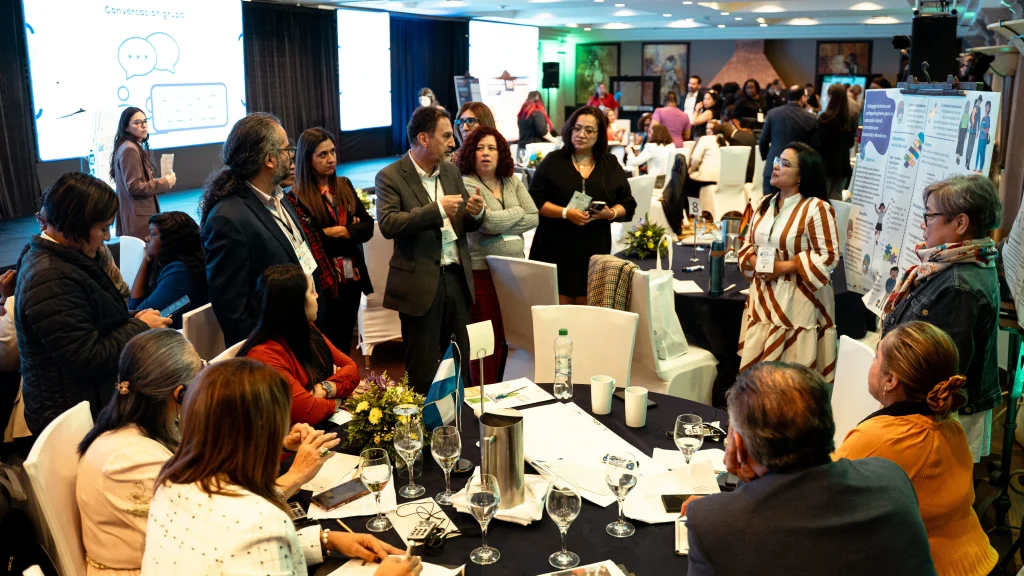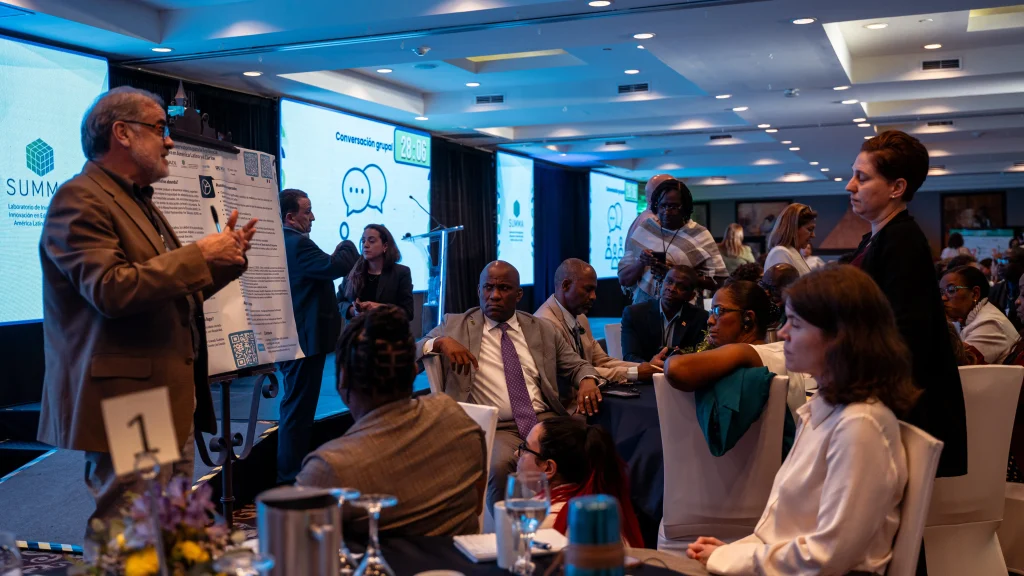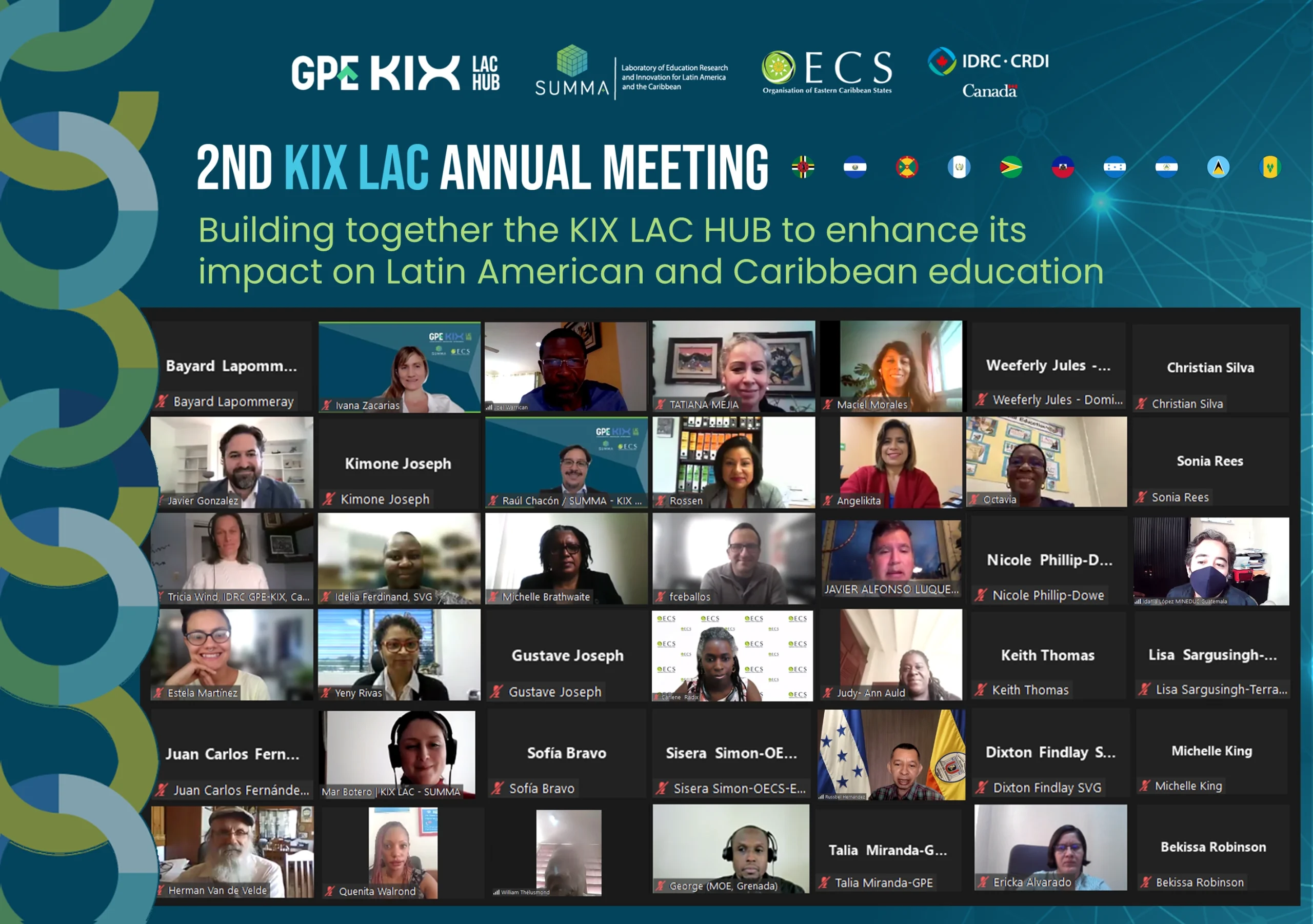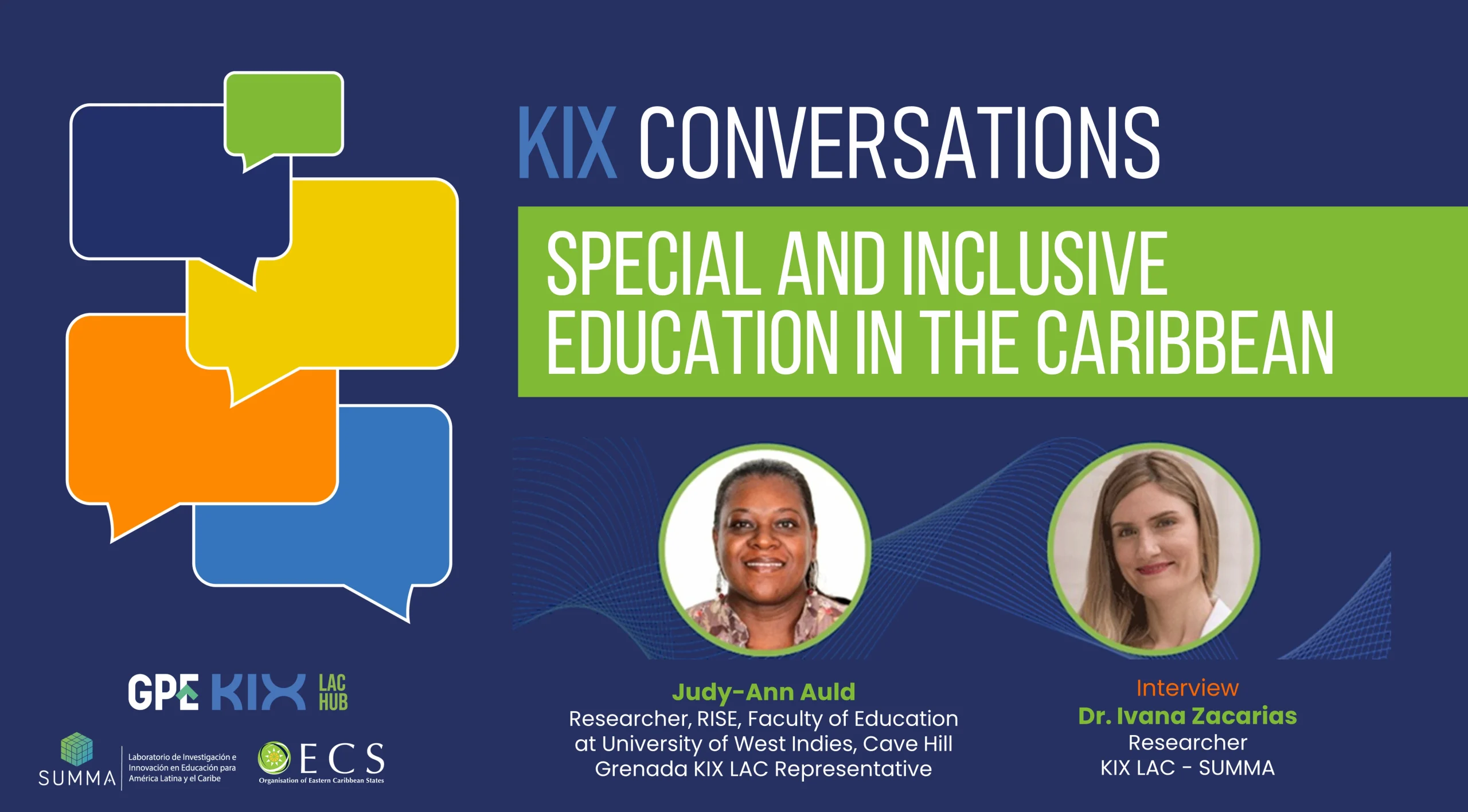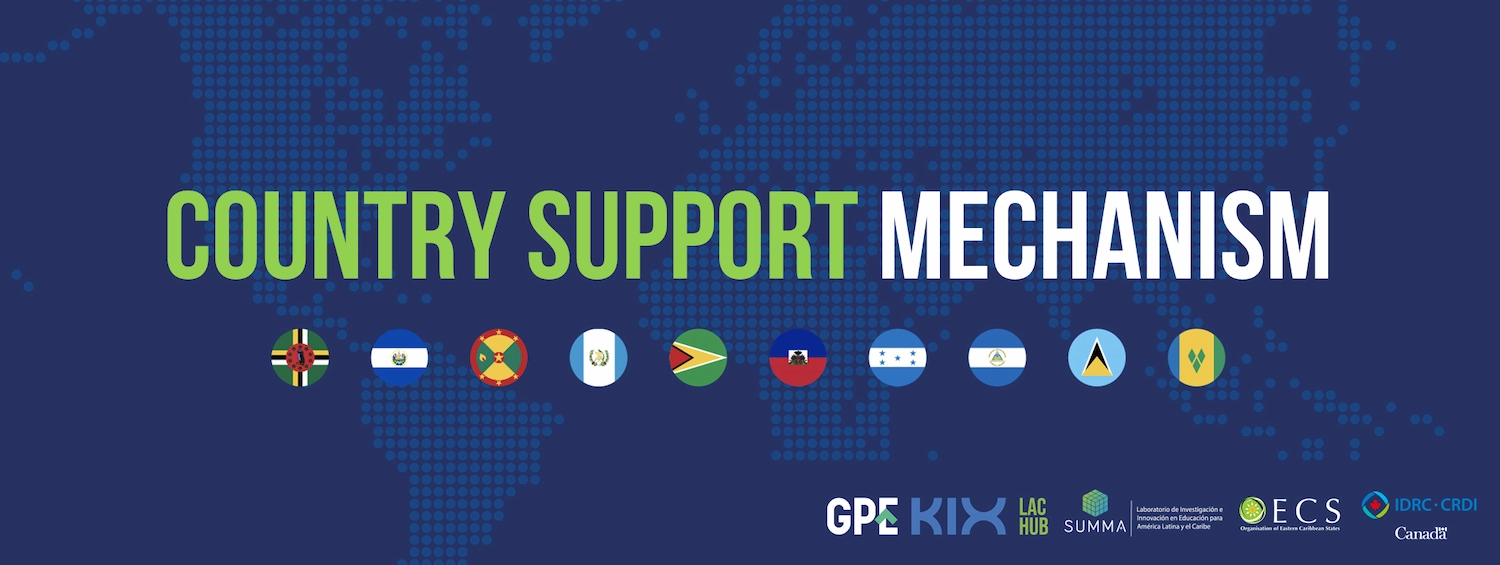KIX LAC High-Level Educational Meeting: Leaders from Latin America and the Caribbean advance a regional agenda to promote educational transformation and social justice based on evidence
30 de June de 2025
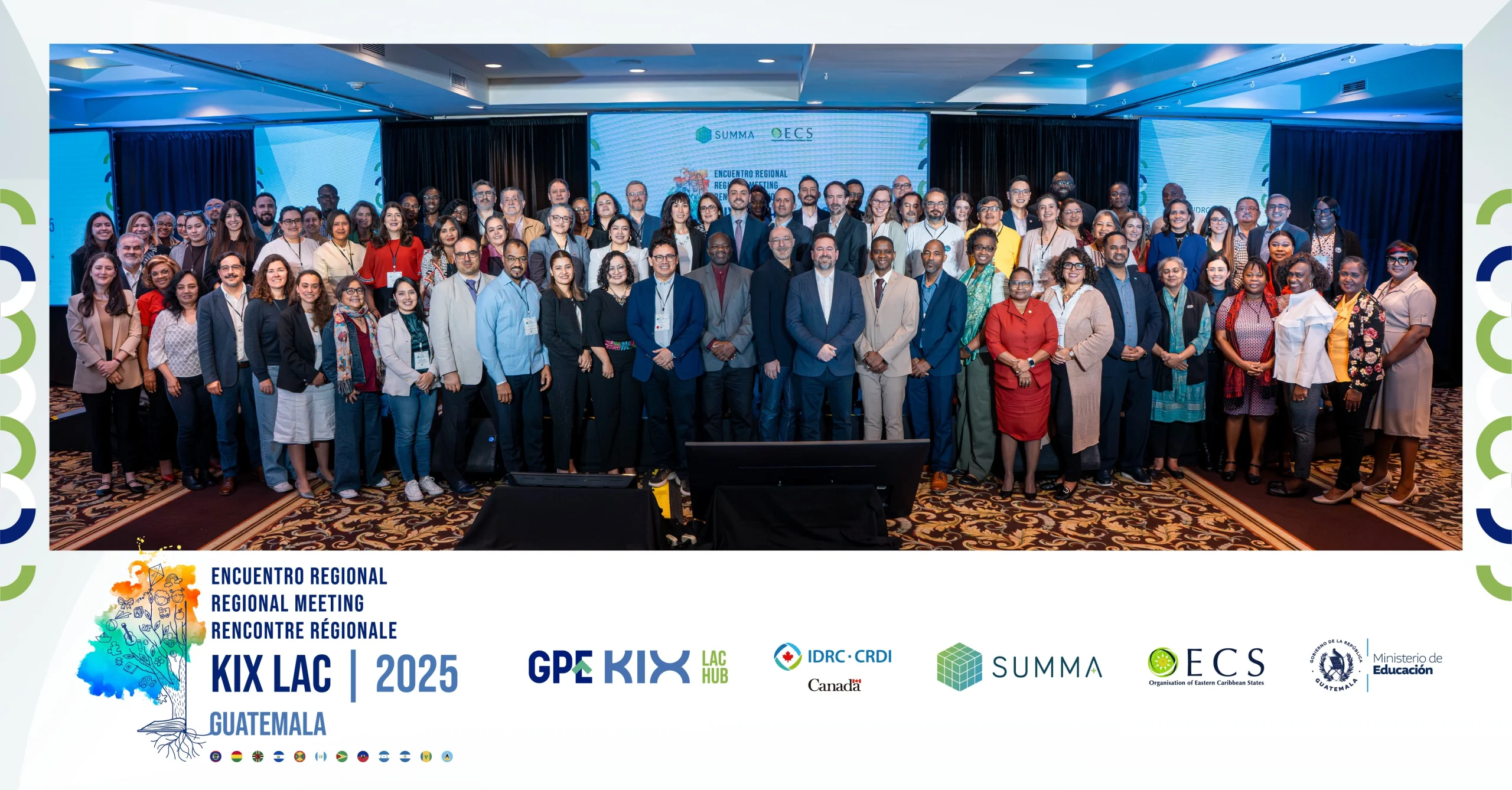
Share
On June 18, 19, and 20, the 5th Regional Meeting KIX LAC: “Guaranteeing Foundational Learning and Holistic Development from Early Childhood: Leveraging Evidence for Educational Transformation and Social Justice in Latin America and the Caribbean” was held in the city of Antigua, Guatemala. The event brought together more than 100 education stakeholders from around the world, including authorities, technical teams, representatives of regional organizations, and specialists, to strengthen cooperation between countries and promote transformative strategies based on the use of evidence and a commitment to a fairer and more equitable education.
Organized by the KIX LAC Hub-an initiative that is part of the Global Partnership for Education Knowledge and Innovation Exchange (GPE KIX), a joint effort with the International Development Research Centre (IDRC) of Canada, and led in Latin America and the Caribbean by SUMMA and the Organization of Eastern Caribbean States (OECS)-, the meeting had the valuable support of the Ministry of Education of Guatemala.
The meeting represented a high-level strategic space that brought together ministers, high-level authorities, and educational leaders from 11 countries in Latin America and the Caribbean. Among them were the Minister of Education of Guatemala, Anabella Giracca; the Technical Vice-Minister of Education of Guatemala, Francisco Cabrera; the Minister of Education of El Salvador, Mauricio Pineda; the Minister of Education of Grenada, David Andrew; the Minister of Education of Saint Vincent and the Grenadines, Curtis King; and the Permanent Secretary of the Ministry of Education of Dominica, Robert Renicks Guiste. Also present were the authorities of the host organizations and partners: Javier González, Director of SUMMA; Raúl Chacón, Director of KIX LAC at SUMMA; Lisa Sargusingh-Terrance, Senior Technical Specialist in Education at the Organization of Eastern Caribbean States (OECS); Marco Mantovanelli, Regional Director for Asia and the Pacific, Europe, Latin America and the Caribbean, and the Middle East, GPE; Ian Macpherson, Knowledge Sharing and Innovation Center (GPE KIX) Team Leader; Tricia Wind, GPE KIX Program Leader, IDRC; and Florencio Ceballos, Program Officer, IDRC. Also present was Sonia Garcia, International Development Officer of the Canadian Embassy in Guatemala.
The event was also attended by participants from international organizations, universities, civil society organizations, delegations from the countries that comprise the regional center, GPE KIX applied research project teams, teachers’ unions, and education experts from throughout the region.
Antigua Commitment
This important meeting culminated in the “Antigua Commitment”, signed by the Ministers of Education, SUMMA, and OECS, which aims to put into action an agreed regional agenda focused on foundational learning, with a view to educational transformation and evidence-based social justice. Through the Antigua Commitment, the signatory ministers commit to the goal of “achieving literacy proficiency for all our children, without exception, ensuring that all children can write, read, and understand what they read by the end of their ninth year”.

Day 1 – June 18
To kick off the event, initial reflections were shared that highlighted the centrality of social justice and inclusion as fundamental pillars for educational transformation in the region. Javier González, director of SUMMA, remarked that equity should not be understood as an add-on, but as the guiding principle of all educational policies. In agreement, the Minister of Education of Guatemala, Anabella Giracca, pointed out that it is not possible to think of education without justice, inclusion, and truth.
From the OECS, Lisa Sargusingh-Terrance called for building a shared purpose to move forward collectively in improving education systems. For his part, Marco Mantovanelli (GPE) stressed the need for sustained internal financing to sustain significant transformations. Along the same lines, Tricia Wind (IDRC-GPE KIX) valued the meeting as a strategic space for sharing lessons learned, aligning priorities, and strengthening capacities.
After the opening remarks, the progress and achievements of the KIX LAC Hub were presented by Raúl Chacón, Director of the KIX LAC Hub at SUMMA; Esthefani Cerrato, Deputy Director General of Educational Research at the Honduran Ministry of Education; and Germain Anthony, Senior Technical Specialist in Education at the OECS. The presentation provided an overview of the main achievements of the initiative in the region, as well as the lessons learned from the collaborative work between countries. Finally, Raúl Chacón emphasized that “it is essential to promote articulations, seek common horizons and build consensus on what matters to us to promote educational improvement in the region”.
One of the highlights of the day was the panel “Learning and foundational competencies: policies, innovations and challenges”, which brought together educational authorities from Central America and the Caribbean to exchange experiences and strategic approaches on this priority issue. Participants included Claudia Morales, General Director of Educational Quality Management of the Ministry of Education of Guatemala; Mauricio Pineda, Minister of Education of El Salvador; David Andrew, minister of education of Grenada; Robert Renicks Guiste, permanent secretary of the Ministry of Education of Dominica; and Curtis King, minister of education of St. Vincent and the Grenadines. The conversation made visible both the progress and the common challenges faced by the countries of the region in strengthening foundational learning from an educational justice perspective.

Subsequently, the applied research projects promoted by GPE KIX in Latin America and the Caribbean were presented. The projects presented on this day were:
- Capacity building for gender equity and inclusion in Caribbean schools| Angel Caglin, Raise Your Voice Saint Lucia Inc.
- Gender Inclusive Pedagogy for Community-Based Early Childhood Education in Guatemala and Honduras| Nelsy Lizarazo Castro, CLADE
- Flexible Educational Trajectories: generating evidence of the alternative education model for adolescents and youth in vulnerable situations in Guatemala | Jorge Gálvez, Universidad del Valle
- Adapting and scaling up peer mentoring of teachers and school leaders for equitable rural education| Josefina Aurtenechea, Educación 2020
After the presentations, a space for networking was generated, in which the speakers talked with participants interested in learning more about the approaches, learning, and progress of each project.
The first day concluded with an opening dinner at which the presentation “Transforming schools to promote literacy: Teaching at the right level” was given by Rukmini Banerji, director general of the Pratham Foundation for Education and winner of the Yidan 2021 Award for Educational Development. In her presentation, she shared experiences and key findings on the Teaching at the Right Level (TaRL) approach, an innovative strategy to improve fundamental literacy skills in contexts with high levels of educational lag.
Day 2 – June 19
The second day began with the presentation “Unlocking High-Quality Teaching” by Yuri Belfali, Head of Early Childhood and Schools Division, Directorate for Education and Skills, OECD, and Rafael Carrasco, Deputy Director, SUMMA. The session addressed approaches and recommendations based on international evidence to strengthen teaching in schools, with emphasis on teacher training, continuous professional development, and the role of education systems in improving the quality of learning. During his intervention, Yuri Belfali stressed that “success in education is multidimensional; it is not only about academic performance, but also, among other things, about resilience, social relationships, psychological well-being, and openness to diversity.”
This was followed by three presentations focused on key themes for strengthening learning from early childhood. Agustín de la Varga, Education Manager of the UNICEF Regional Office for Latin America and the Caribbean, addressed the main challenges and opportunities in the field of early childhood education and care in the region.
Next, Laurette Bristol, director of the School of Education at the Cave Hill Campus of the University of the West Indies, presented the advances in the reform and innovation of initial teacher education in the Eastern Caribbean States, with a focus on improving pedagogical practices.
Veveu Arruda, president of the Associação Bem Comum of Brazil, shared the experience of the municipality of Sobral as a successful case in improving literacy in the early years, recognized as a reference model at the regional and international level.
Closing the second day’s block of thematic presentations, Javier González, director of SUMMA, addressed the topic “Inclusive financing to support learning and foundational competencies”. In his presentation, he remarked that increasing educational spending is necessary, but not sufficient, and stressed the importance of moving towards models that consider criteria of sufficiency, effectiveness, efficiency, equity, and transparency, in order to ensure adequate and sustainable resources that guarantee real learning opportunities for all students.
The day continued with the panel “Building the Resilience of Education Systems for Early Childhood: Challenges and Opportunities in the Region”, which brought together voices from different sectors to reflect on how to strengthen the responses of education systems to crisis and vulnerability scenarios. Participants included Santiago Cueto, senior researcher at GRADE; Rocío Oliver López, consultant and project leader at Universidad del Valle; Hervé Boursiquot, director general of the National Office for Educational Cooperation of Haiti; and Curtis King, Minister of Education of St. Vincent and the Grenadines. Concrete experiences and regional approaches to protect and promote comprehensive early childhood development, even in adverse contexts, were shared.
In continuity with the dynamic of presentation and exchange initiated the previous day, during the second day, the remaining applied research projects of GPE KIX in Latin America and the Caribbean were shared. After the presentations, the speakers had a space for dialogue with the attendees, where they answered questions and deepened their approaches.
The projects presented were:
- Scaling a learning model through play for early childhood education in El Salvador | Ericka Alvarado, Fundación Educo.
- AdaptED: Observatory for Educational Adaptation in Latin America and the Caribbean | Santiago Cueto, GRADE. The project seeks to produce knowledge to support countries in the region to generate dialogue in their educational systems, which will allow them to improve their adaptive capacity to face emergency scenarios.
- Empowering Teacher Initiative (ETI)in Latin America and the Caribbean | Dante Castillo, SUMMA. It aims to help address the professional needs of all teachers and transform teacher professional development systems to make them more equitable, effective, and efficient.
- Education Out Loud | Carolina Orellana, OXFAM Guatemala
Day 3 – June 20
The third and last day of the meeting began with a panel dedicated to the role of international cooperation in strengthening education policies in the region. Under the title “Financing and technical expertise at the service of policies for the promotion of foundational learning”, the panel was attended by representatives of multilateral organizations who shared perspectives and strategies to support countries in their efforts to improve learning. The panel was attended by Marco Mantovanelli, regional director of GPE; Gregory Elacqua, senior economist in the IDB’s Education Division; Tricia Wind, leader of the GPE KIX program at IDRC; and Ana Lucía Morales, education specialist at UNICEF Guatemala. The conversation highlighted the value of articulated work between governments and international agencies to ensure sustainable, equitable, and evidence-based education policies.
The day continued with the presentation of the outstanding projects of the KIX LAC Hub, a space designed to share relevant advances of ongoing initiatives, encourage peer feedback, and strengthen mutual learning between countries. Experiences were presented on the strategic use of evidence, institutional collaboration, and the development of concrete tools for decision-making in education policy. At the end, a collective reflection session was held in which participants recognized key lessons learned, identified common challenges, and reaffirmed their commitment to new forms of sub-regional collaboration.
The initiatives presented were:
- Regional Strategy GPE | Katherina Hruskovec and Mohamed Yassine, national engagement officers, GPE.
- Coalition of Faculties of Education | Laurette Bristol, director, School of Education, Cave Hill Campus, UWI, and Raul Chacon, director, KIX LAC, SUMMA.
- Early Year Toolkit (EEF) | Amy Faux, senior international manager, and Sandra Creixell, project manager, Early Childhood and Enhanced Practice Centers, Education Endowment Foundation (EEF).
- Impacta+ | María José Sepúlveda, Director of Evaluation at SUMMA, who presented Impacta+, an ecosystem of resources created by SUMMA to strengthen the culture of evaluation in Latin America and the Caribbean, promoting concrete improvements in educational interventions.
- SUMMA – OECD Study: “The Politics of Education Policy Reforms: Actors, Dynamics, and Evidence Use in Latin America and the Caribbean Education Systems” | Pedro Garret, Project and Research Coordinator of KIX LAC.
To close the event, authorities and representatives of the participating organizations shared their final reflections and closing remarks. In a climate of commitment and collaboration, they highlighted the richness of the exchange, the quality of the lessons learned, and the importance of continuing to strengthen joint work at the regional level. The meeting concluded with a call to deepen cooperation between countries, to continue promoting the strategic use of evidence, and to redouble efforts to ensure equitable, inclusive, and quality education from the early years of life.


